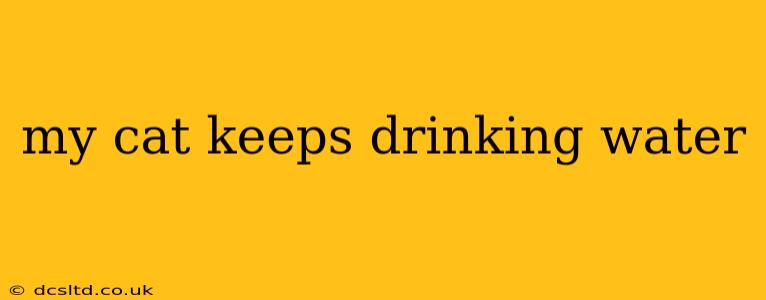Cats, like all creatures, need water to survive. However, excessive water consumption, known as polydipsia, in cats can signal underlying health issues that require veterinary attention. This comprehensive guide will help you understand why your cat might be drinking more water than usual, what to look for, and when it's time to seek professional help.
Why is My Cat Drinking So Much Water?
Increased water intake in cats can stem from various factors, ranging from simple environmental changes to serious medical conditions. Let's explore some of the most common reasons:
-
Increased Activity: Just like humans, a more active cat will need to replenish fluids more frequently. A recent change in their activity level, such as a new toy or more playtime, could be a contributing factor.
-
Environmental Factors: Hot weather, dry air (especially during winter months when heating is used), and a lack of fresh water can all lead to increased water consumption. Ensure your cat always has access to fresh, clean water in multiple locations around your home.
-
Diet: The type of food your cat eats can influence its water intake. Dry kibble contains less moisture than wet food, potentially leading to increased drinking. Switching to a higher-moisture diet might help.
-
Underlying Medical Conditions: This is the most crucial aspect to consider. Many health problems can cause polydipsia, including:
- Diabetes: This chronic disease affects the body's ability to process sugar, leading to increased thirst and urination.
- Kidney Disease: Damaged kidneys struggle to concentrate urine, resulting in increased water loss and the need to drink more.
- Hyperthyroidism: An overactive thyroid gland can increase metabolism, leading to greater thirst.
- Infections: Urinary tract infections (UTIs) and other infections can cause discomfort and increased fluid intake.
What are the Signs of Excessive Water Consumption in Cats?
Recognizing excessive water intake isn't always straightforward. Look for these signs in conjunction with increased drinking:
- Frequent Urination: Increased water intake usually leads to increased urination. Observe the frequency and volume of your cat's urination.
- Wet Fur: If your cat's fur is consistently damp around the genital area, it could indicate frequent urination.
- Weight Loss: Unexpected weight loss, often accompanied by increased thirst and urination, can be a sign of underlying health problems.
How Much Water Should My Cat Drink?
There's no single answer to this question, as individual needs vary depending on factors like size, activity level, diet, and overall health. However, a significant increase in water intake compared to your cat's usual habits warrants attention.
When Should I Take My Cat to the Vet?
If you notice a sudden or significant increase in your cat's water consumption, accompanied by any of the signs mentioned above, schedule a veterinary appointment immediately. Early diagnosis and treatment are crucial for managing underlying health issues and improving your cat's quality of life. Don't delay seeking professional help if you're concerned.
My Cat is Drinking More Water and Urinating More: What Could It Be?
This combination of symptoms strongly suggests a potential underlying medical condition. It's vital to consult your veterinarian to determine the cause. They will perform a thorough examination, including blood and urine tests, to identify any underlying health problems.
Is Increased Water Intake in Cats Always a Sign of Disease?
While increased water intake often signals an underlying medical problem, it's not always the case. Environmental factors and diet changes can also contribute. However, it's always best to err on the side of caution and seek veterinary advice if you're unsure.
Can Changes in Diet Affect My Cat's Water Intake?
Absolutely! Switching to a diet with a higher moisture content, such as wet food, can often reduce a cat's need to drink as much water. Consult your vet for dietary recommendations tailored to your cat's specific needs.
By carefully monitoring your cat's water intake and recognizing the signs of potential problems, you can ensure their health and well-being. Remember, prompt veterinary attention is key to addressing any underlying health concerns.
